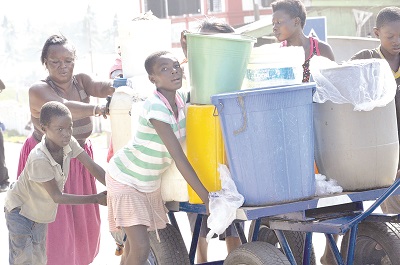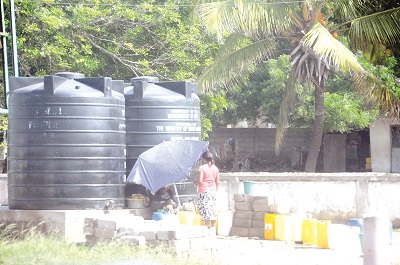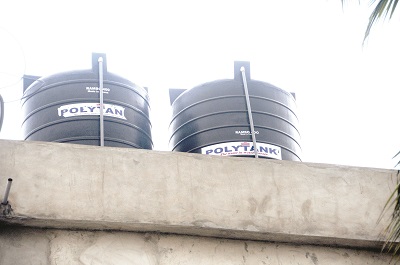Storing water in the midst of scarcity
By Doreen Hammond
The perennial scenes of people carrying all sorts of containers in search of water in Accra and other parts of the country seem to have come to stay.
Advertisement
 Polytanks of all shapes and sizes mounted on top of houses as well as concrete and other types of storage tanks have become a necessity in most homes.
Polytanks of all shapes and sizes mounted on top of houses as well as concrete and other types of storage tanks have become a necessity in most homes.
This is because the Ghana Water Company has not been able to supply water on a regular basis to most Ghanaian homes.
For areas such as Ashongman and parts of Ablekuma where distribution lines don’t even exist, solution to residents’ water problems is nowhere in sight.
Residents have been compelled out of necessity to rely on water tanker services. Unfortunately, water tanker services have proved to be expensive as the customer has to pay for both water and transportation. Five hundred gallons of borehole water supplied by a tanker costs GH¢25. For tap water, it is about GH¢60 depending on how far the tanker has to travel to get it.
Nii, a water tanker driver at Kwabenya, says the water tanker business is good but depends on the state of the truck.
Maame Korama is a resident of Adentan. She says that in spite of the many announcements that the water problem at Adentan has been solved, that has not been the case.
“I still depend on water tanker services and spend about GH¢90 on 500 gallons of water every three and half weeks for my family of six,” she said.
“ We use this water very judiciously because we cannot afford to buy more, our taps have not been running since July, 2012”, she said.
Boreholes
To solve the problem and gain a more affordable access to water, some individuals have dug wells with manpower. This age old method has, however, proved very unreliable as far as rocky areas are concerned as digging goes on and on with no water in sight resulting in the loss of money and energy.
In Accra, this method is giving way to a more scientific way of doing it—the drilling of mechanised boreholes. While it could cost about GH¢2,100 to dig a well, the drilling of boreholes with machines costs about GH¢7,000.
With this method, some sort of feasibility is done to locate the exact location where there is water before drilling. But that is not all, as there is no guarantee for the quality and quantity of water from this source. It could, for instance, contain too much iron.
Water analysis
As Dr Osmund Ansa—Asare, an environmental chemist and a Principal Research Scientist of the Water Research Institute of the Council for Scientific and Industrial research, puts it “not all water from boreholes is clean”.
“Some of the water from boreholes could contain microbes which may be harmful to health” he said.
He, therefore, advises that after the borehole is dug, a sample of the water is taken to the Water Research Institute for testing and advice.
 For those who are lucky to have water flowing through their taps, even on irregular basis, the challenge is how to store it hygienically.
For those who are lucky to have water flowing through their taps, even on irregular basis, the challenge is how to store it hygienically.
Dr Ansa-Asare says that storing water in polytanks and concrete tanks is good but strongly advises that the water be treated with chlorine tablets, according to the manufacturer’s instructions before use. He also recommends that the storage tanks/containers be cleaned thoroughly regularly.
He cautions that failure to adhere to that instruction could have serious health consequences.
“Chlorine is a bleaching agent, therefore, too much can harm the intestines and too little cannot do the job”.
A number of people use filtration to treat the water they get from any source before use. Madam Jane Amorkor is a resident of Nungua and even though she says the water situation in her area is not that bad, she has bought a water filter which uses candles.
“I filter any water I store in my polytanks before use and even the water I get from the taps, to be on the safer side”, she says.
Madam Jane has converted her bath tub into a container for storing water and has constructed a bath house without a tub.
A water filter removes impurities from water by means of a fine physical barrier, a chemical process or a biological process. Filters cleanse water to different extents for purposes such as irrigation, drinking water, aquariums, and swimming pools.
Treating rain water for use
Mr Kassim Yakubu, a programmes officer of WaterAid, an NGO which carries out water, sanitation and hygiene education, says rain water harvesting could be an alternative source of water supply in areas where groundwater potential is very low.
He said that by WHO standards as well as the Ghana Standards Authority regulations, all water sources meant for drinking must go through water quality test analysis (bacteriological and physicochemical analysis) before being put to use, adding that rain water was not an exception.
He explained that because rainwater had to travel through a process before getting to the end user, there was the high possibility that it could be contaminated.
A likely source of rainwater contamination, he said, was dust in the air and dirt accumulated on top of roofs.
What is the correct way to store water?
On the correct way to store water, Mr Yakubu says the use of containers with narrow openings for filling, and dispensing devices such as spouts or taps protect the collected water during storage and household use.
Improved containers protect stored household water from the introduction of microbial contaminants via contact with hands, dippers, other faecally contaminated vehicles or the intrusion of vectors.
He recommends the use of clean containers of heavy, opaque plastic with screw-on caps for the storage of water.
Where to store water
With regard to where to store water, Mr Yakubu says containers in which water is stored should be out of the way of direct sunlight at a place that is also cool and dry.
 On how long to store water, the programmes officer said water can be safely stored for six months stretching to a year, depending on how it is packaged.
On how long to store water, the programmes officer said water can be safely stored for six months stretching to a year, depending on how it is packaged.
“If it's commercially-bottled "spring" or "drinking" water, it can be stored for a year as long as the container isn't opened. Once the container is opened, the water must be used immediately”, he advised.
He recommends, however, that tap water is stored for six months maximum and says it is a good idea to label and date the water bottles or containers to serve as a reminder.
And for those who have been putting naphthalene balls (camphor) in the water they store , Dr Frank Owusu- Sekyere, a doctor at the Korle Bu Teaching Hospital and President of the Greater Accra Regional Branch of the Ghana Medical Association, says it is very harmful to health.
He says those who do so claim it gives the water a pleasant smell and taste “but this is dangerous because it affects the kidneys in the long run”.
Since there are no signs that the nation’s water problems are about to end anytime soon, residents’, best bet is to learn how to store water and store it in a proper way in order to remain healthy.
Writer’s e-mail: [email protected]




